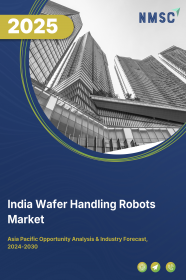
India Wafer Handling Robots Market by Product Type (Vacuum Wafer Handling Robots and Atmospheric Wafer Handling Robots), by Number of Arms (Single Arm and Dual Arm), by Robot Type (Linear Robots, SCARA Robots, Articulated Robots, Cylindrical Robot, and Others), by Operation (Motor Driven and Belt Driven), by Installation (Free Standing and Integrated), by End Use (Integrated Device Manufacturer (IDM) and Foundries) – Opportunity Analysis and Industry Forecast, 2024–2030
Industry: ICT & Media | Publish Date: 15-Feb-2025 | No of Pages: 169 | No. of Tables: 132 | No. of Figures: 97 | Format: PDF | Report Code : IC2082
US Tariff Impact on India Wafer Handling Robots Market
Trump Tariffs Are Reshaping Global Business
India Wafer Handling Robots Market Overview
India Wafer Handling Robots Market size was valued at USD 11.3 million in 2023, and is predicted to reach USD 30.4 million by 2030, at a CAGR of 14.4% from 2024 to 2030. Also, the market size was 401.0 units in 2023, and is predicted to reach 1519.0 units by 2030, with a CAGR of 19.9% from 2024 to 2030. A wafer handling robot represents a specialized robotic solution designed to streamline the complex procedures inherent in semiconductor manufacturing. These robots demonstrate exceptional proficiency in executing precise movements and positioning tasks with fragile semiconductor wafers.
Their significance lies in their pivotal role in the creation of top-tier integrated circuits and microelectronic devices. Operating within pristine cleanroom environments, they incorporate a diverse range of end effectors, sensors, and vision systems to securely grasp, inspect, and manipulate wafers, all while mitigating the risks of damage or contamination. By seamlessly integrating with other fabrication equipment, these robots not only boost operational efficiency and minimize errors but also foster the consistent production of cutting-edge semiconductor technologies that power an extensive array of contemporary devices.
Government Initiatives in Semiconductor Labs Propels the Growth of the India Wafer Handling Robots Market
The burgeoning government efforts in India, particularly in the establishment of semiconductor labs, are driving the expansion of the market for wafer handling robots. As of January 2022, the Indian government launched a significant initiative known as the 'Semiconductor Fabs Establishment Initiative,' with a budget exceeding $10 billion. This initiative aims to provide financial support to individuals and organizations seeking to establish semiconductor fabrication facilities within India's borders.
By enticing substantial investments into semiconductor wafer fabrication facilities, the initiative seeks to strengthen the electronics manufacturing sector in India. With a planned duration spanning six years, the program offers tailored financial support to facilitate the establishment of Silicon CMOS-based semiconductor fabs, aligning with the industry's technological requirements. This surge in government-driven semiconductor initiatives directly correlates with the heightened demand for wafer handling robots within the Indian market.
Strengthening Electronics Manufacturing Sector Fuel, the Growth of the India Wafer Handling Robots Market
The Indian government's focus on semiconductor labs and fabrication facilities is instrumental in fortifying the electronics manufacturing sector, thus driving demand for wafer handling robots. The 'Semiconductor Fabs Establishment Initiative' aims to enhance India's capabilities in semiconductor manufacturing, which is crucial for the country's technological advancement and economic growth.
By providing financial support and incentives for the establishment of semiconductor fabs, the initiative fosters innovation and investment in semiconductor technologies. As India strives to become self-reliant in semiconductor production, the demand for wafer handling robots is expected to increase significantly to support semiconductor manufacturing processes. Thus, government initiatives aimed at strengthening the electronics manufacturing sector are key drivers for the wafer handling robots market in India.
High Initial Cost Restrains the India Wafer Handling Robots Market Growth
The substantial expense associated with wafer robots pose a significant hurdle to market expansion. The upfront investment necessary to procure, integrate, and sustain these advanced automation systems represents a considerable financial challenge for companies, particularly those with constrained budgets. This financial barrier has the potential to dissuade prospective adopters from entering the market or scaling up their automation capabilities.
Incorporation of Advanced Technologies such as Computer Vision and AI to Enhance Precision
The incorporation of advanced technologies like Artificial Intelligence (AI), computer vision, and the Internet of Things (IoT) into robots offers extensive opportunities for the wafer handling robots market expansion. These integrations empower wafer handling robots to streamline processes, boost operational efficiency, and facilitate predictive maintenance. AI algorithms are instrumental in refining robot movements, enhancing quality control by detecting defects in real-time, and forecasting maintenance requirements.
Computer vision ensures precise handling of wafers and accurate object recognition, even in complex operational environments, while IoT connectivity enables real-time monitoring, data exchange, and predictive maintenance, thereby minimizing downtime. Moreover, the inclusion of advanced safety features, data analytics capabilities, and improvements in energy efficiency further highlight the crucial role of wafer handling robots as indispensable assets in the dynamic semiconductor manufacturing industry.
Competitive Landscape
The India wafer handling robots industry comprises various market players, such as include Kawasaki Heavy Industries, Ltd., Nidec Instruments Corporation, Yaskawa Electric Corp., RORZE Corporation, DAIHEN Corporation, Hirata Corporation, Rexxam Co., Ltd., KUKA AG, ULVAC, Inc., and Stäubli International AG.
India Wafer Handling Robots Market Key Segments
By Product Type
-
Vacuum Wafer Handling Robots
-
Atmospheric Wafer Handling Robots
By Number of Arms
-
Single Arm
-
Dual Arm
By Robot Type
-
Linear Robots
-
SCARA Robots
-
Articulated Robots
-
Cylindrical Robot
-
Others
By Operation
-
Motor Driven
-
Belt Driven
-
Stainless Steel Belts
-
Rubber Belts
-
Polymer Belts
-
By Installation
-
Free Standing
-
Integrated
By Wafer Size
-
Up to 100 mm
-
150 mm
-
200 mm
-
300 mm
-
Above 300 mm
By Semiconductor Process
-
Oxidation (Deposition)
-
Lithography
-
Etching, Cleaning, Polishing
-
Inspection & Testing
-
Assembly & Packaging
By End Use
-
Integrated Device Manufacturer (IDM)
-
Foundries
REPORT SCOPE AND SEGMENTATION:
|
Parameters |
Details |
|
Market Size in 2023 |
USD 11.3 Million |
|
Revenue Forecast in 2030 |
USD 30.4 Million |
|
Growth Rate |
CAGR of 14.4% from 2024 to 2030 |
|
Market Volumes in 2023 (units) |
401.0 |
|
Volumes Forecast in 2030 (units) |
1519.0 |
|
Growth Rate |
19.9% |
|
Analysis Period |
2023–2030 |
|
Base Year Considered |
2023 |
|
Forecast Period |
2024–2030 |
|
Market Size Estimation |
Million (USD) |
|
Growth Factors |
|
|
Companies Profiled |
10 |
|
Market Share |
Available for 10 companies |
|
Customization Scope |
Free customization (equivalent up to 80 working hours of analysts) after purchase. Addition or alteration to country, regional, and segment scope. |
|
Pricing and Purchase Options |
Avail customized purchase options to meet your exact research needs. |
KEY PLAYERS
-
Kawasaki Heavy Industries, Ltd.
-
Nidec Instruments Corporation
-
Yaskawa Electric Corp.
-
RORZE Corporation
-
DAIHEN Corporation
-
Hirata Corporation
-
Rexxam Co., Ltd.
-
KUKA AG
-
ULVAC, Inc.
-
Stäubli International AG

















 Speak to Our Analyst
Speak to Our Analyst





















